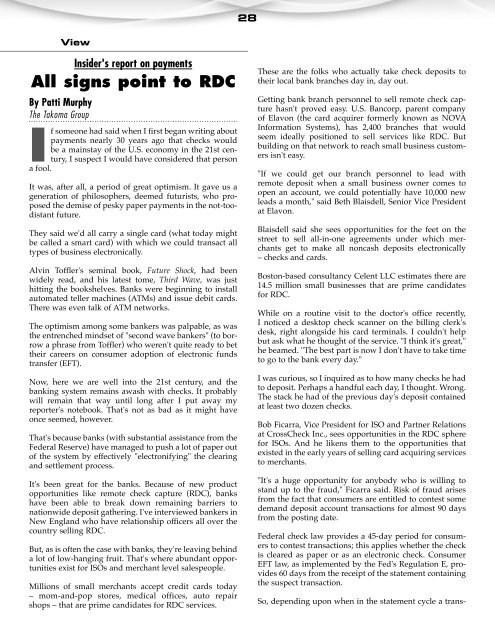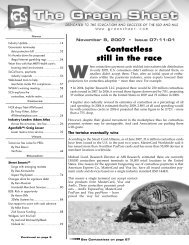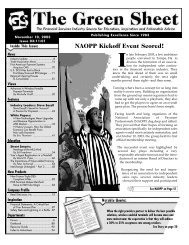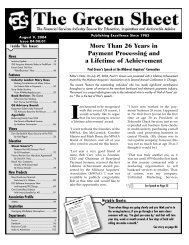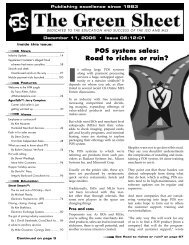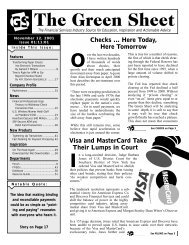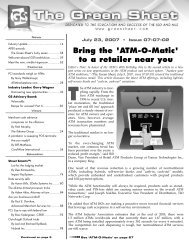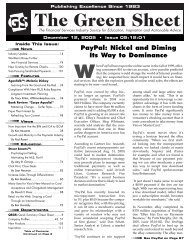View PDF of this issue - The Green Sheet
View PDF of this issue - The Green Sheet
View PDF of this issue - The Green Sheet
You also want an ePaper? Increase the reach of your titles
YUMPU automatically turns print PDFs into web optimized ePapers that Google loves.
28<br />
<strong>View</strong><br />
Insider's report on payments<br />
All signs point to RDC<br />
By Patti Murphy<br />
<strong>The</strong> Takoma Group<br />
If someone had said when I first began writing about<br />
payments nearly 30 years ago that checks would<br />
be a mainstay <strong>of</strong> the U.S. economy in the 21st century,<br />
I suspect I would have considered that person<br />
a fool.<br />
It was, after all, a period <strong>of</strong> great optimism. It gave us a<br />
generation <strong>of</strong> philosophers, deemed futurists, who proposed<br />
the demise <strong>of</strong> pesky paper payments in the not-toodistant<br />
future.<br />
<strong>The</strong>y said we'd all carry a single card (what today might<br />
be called a smart card) with which we could transact all<br />
types <strong>of</strong> business electronically.<br />
Alvin T<strong>of</strong>fler's seminal book, Future Shock, had been<br />
widely read, and his latest tome, Third Wave, was just<br />
hitting the bookshelves. Banks were beginning to install<br />
automated teller machines (ATMs) and <strong>issue</strong> debit cards.<br />
<strong>The</strong>re was even talk <strong>of</strong> ATM networks.<br />
<strong>The</strong> optimism among some bankers was palpable, as was<br />
the entrenched mindset <strong>of</strong> "second wave bankers" (to borrow<br />
a phrase from T<strong>of</strong>fler) who weren't quite ready to bet<br />
their careers on consumer adoption <strong>of</strong> electronic funds<br />
transfer (EFT).<br />
Now, here we are well into the 21st century, and the<br />
banking system remains awash with checks. It probably<br />
will remain that way until long after I put away my<br />
reporter's notebook. That's not as bad as it might have<br />
once seemed, however.<br />
That's because banks (with substantial assistance from the<br />
Federal Reserve) have managed to push a lot <strong>of</strong> paper out<br />
<strong>of</strong> the system by effectively "electronifying" the clearing<br />
and settlement process.<br />
It's been great for the banks. Because <strong>of</strong> new product<br />
opportunities like remote check capture (RDC), banks<br />
have been able to break down remaining barriers to<br />
nationwide deposit gathering. I've interviewed bankers in<br />
New England who have relationship <strong>of</strong>ficers all over the<br />
country selling RDC.<br />
But, as is <strong>of</strong>ten the case with banks, they're leaving behind<br />
a lot <strong>of</strong> low-hanging fruit. That's where abundant opportunities<br />
exist for ISOs and merchant level salespeople.<br />
Millions <strong>of</strong> small merchants accept credit cards today<br />
– mom-and-pop stores, medical <strong>of</strong>fices, auto repair<br />
shops – that are prime candidates for RDC services.<br />
<strong>The</strong>se are the folks who actually take check deposits to<br />
their local bank branches day in, day out.<br />
Getting bank branch personnel to sell remote check capture<br />
hasn't proved easy. U.S. Bancorp, parent company<br />
<strong>of</strong> Elavon (the card acquirer formerly known as NOVA<br />
Information Systems), has 2,400 branches that would<br />
seem ideally positioned to sell services like RDC. But<br />
building on that network to reach small business customers<br />
isn't easy.<br />
"If we could get our branch personnel to lead with<br />
remote deposit when a small business owner comes to<br />
open an account, we could potentially have 10,000 new<br />
leads a month," said Beth Blaisdell, Senior Vice President<br />
at Elavon.<br />
Blaisdell said she sees opportunities for the feet on the<br />
street to sell all-in-one agreements under which merchants<br />
get to make all noncash deposits electronically<br />
– checks and cards.<br />
Boston-based consultancy Celent LLC estimates there are<br />
14.5 million small businesses that are prime candidates<br />
for RDC.<br />
While on a routine visit to the doctor's <strong>of</strong>fice recently,<br />
I noticed a desktop check scanner on the billing clerk's<br />
desk, right alongside his card terminals. I couldn't help<br />
but ask what he thought <strong>of</strong> the service. "I think it's great,"<br />
he beamed. "<strong>The</strong> best part is now I don't have to take time<br />
to go to the bank every day."<br />
I was curious, so I inquired as to how many checks he had<br />
to deposit. Perhaps a handful each day, I thought. Wrong.<br />
<strong>The</strong> stack he had <strong>of</strong> the previous day's deposit contained<br />
at least two dozen checks.<br />
Bob Ficarra, Vice President for ISO and Partner Relations<br />
at CrossCheck Inc., sees opportunities in the RDC sphere<br />
for ISOs. And he likens them to the opportunities that<br />
existed in the early years <strong>of</strong> selling card acquiring services<br />
to merchants.<br />
"It's a huge opportunity for anybody who is willing to<br />
stand up to the fraud," Ficarra said. Risk <strong>of</strong> fraud arises<br />
from the fact that consumers are entitled to contest some<br />
demand deposit account transactions for almost 90 days<br />
from the posting date.<br />
Federal check law provides a 45-day period for consumers<br />
to contest transactions; <strong>this</strong> applies whether the check<br />
is cleared as paper or as an electronic check. Consumer<br />
EFT law, as implemented by the Fed's Regulation E, provides<br />
60 days from the receipt <strong>of</strong> the statement containing<br />
the suspect transaction.<br />
So, depending upon when in the statement cycle a trans-


